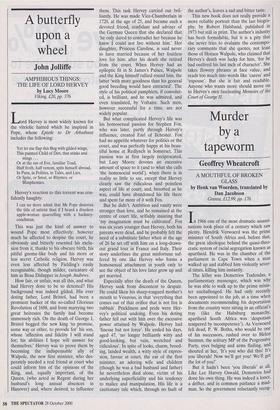A butterfly upon a wheel
John Jolliffe
AMPHIBIOUS THINGS: THE LIFE OF LORD HERVEY by Lucy Moore Viking, £20, pp. 376 Lord Hervey is most widely known for the vitriolic hatred which he inspired in Pope, whose Epistle to Dr Arbuthnot includes the following:
Yet let me flap this Bug with gilded wings, This painted Child of Dirt, that stinks and stings .
Or at the ear of Eve, familiar Toad, Half froth, half venom, spits himself abroad, In Puns, in Politics, in Tales, and Lies, Or Spite, or Smut, or Rhymes, or Blasphemies.
Hervey's reaction to this torrent was con- fidently haughty: I can no More admit that Mr Pope deserves the title of satirist than if I heard a drunken apple-woman quarrelling with a hackney- coachman.
This was just the kind of answer to wound Pope most effectively: however much he affected to despise the court, he obviously and bitterly resented his exclu- sion from it, thanks to his obscure birth, his pitiful gnome-like body and his more or less secret Catholic religion. Hervey was even less affected by Fielding's easily recognisable, though milder, caricature of him as Beau Didapper in Joseph Andrews.
How fair, or unfair, was all this, and what had Hervey done to be so detested? His background was indeed gilded. His ever doting father, Lord Bristol, had been a promient backer of the so-called Glorious Revolution of 1688, and from marrying two great heiresses the family had become immensely rich. On the death of George I, Bristol begged the new king `to promise, some way or other, to provide for' his son, whose 'affection and fidelity I will stand for; his abilities I hope will answer for themselves.' Hervey was to prove them by becoming the indispensable ally of Walpole, the new first minister, who des- perately needed a real friend at court who could inform him of the opinions of the King, and, equally important, of the Queen, (who acted as Regent during her husband's long annual absences in Hanover) and, where desired, to influence them. This task Hervey carried out bril- liantly. He was made Vice-Chamberlain in 1720, at the age of 25, and became such a devoted friend, confidant and adviser of the German Queen that she declared that `he only dared to contradict her because he knew I could not live without him.' Her daughter, Princess Caroline, is said never to have married because of her fruitless love for him: after his death she retired from the court. When Hervey had an epileptic fit in St James's Palace, Walpole and the King himself rallied round him, the latter 'with more goodness than his general good breeding would have extracted'. The style of his political pamphlets, if convolut- ed, is brilliant, and he was admired, and even translated, by Voltaire. Such men, however successful for a time, are not widely popular.
But what complicated Hervey's life was his homosexual passion for Stephen Fox, who was later, partly through Hervey's influence, created Earl of Ilchester. Fox had no appetite whatever for politics or the court, and was perfectly happy at his beau- tiful home at Redlynch in Somerset. This passion was at first largely reciprocated, but Lucy Moore devotes an excessive amount of space to it (and to what she calls `the homosocial world'), when there is in reality so little to say, except that Hervey clearly saw the ridiculous and pointless aspect of life at court, and, besotted as he was, could have abandoned his life there and spent far more of it with Fox.
But he didn't. Ambition and vanity were stronger than love, and he remained at the centre of court life, selfishly insisting that `my imagination must be cultivated'. Fox was six years younger than Hervey, both his parents were dead, and he probably felt the need of a substitute father when at the age of 26 he set off with him on a long-drawn- out grand tour in France and Italy. Their story underlines the great misfortune suf- fered by one like Hervey who forms a homosexual attachment in youth only to see the object of his love later grow up and get married.
Especially after the death of the Queen, Hervey sank from discontent to despair, He could liken his sharp-tongued mother's mouth to Vesuvius, in that 'everything that comes out of that orifice that is not fire is rubbish'. Prickliness and pride were Her- vey's political undoing. Even his doting father fell out with him over the excessive power attained by Walpole. Hervey had `finesse but not force'. He ended his days, aged 47, `no longer brilliantly witty and good-looking, but vain, wretched and ridiculous'. In spite of looks, charm, breed- ing, landed wealth, a witty style of expres- sion, favour at court, the ear of the first minister, an adoring wife and children (though he was a bad husband and father) he nevertheless died alone, victim of his underlying superficiality and his tendency to malice and manipulation. His life is a cautionary tale which, through no fault of the author's, leaves a sad and bitter taste.
This new book does not really provide a more reliable portrait than the last biogra- phy, by Robert Halsband, published in 1973 but still in print. The author's industry has been formidable, but it is a pity that she never tries to evaluate the contempo- rary comments that she quotes, not least those of Horace Walpole, who claimed that Hervey's death was lucky for him, 'for he had outlived his last inch of character'. She takes flowery phrases at face value, and reads too much into words like 'caress' and `espouse'. But she is fair and readable. Anyone who wants more should move on to Hervey's own fascinating Memoirs of the Court of George II.


























































































 Previous page
Previous page